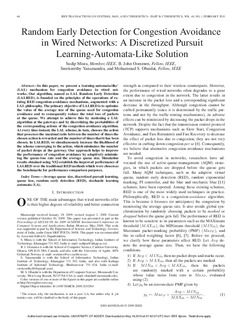Random Early Detection for Congestion Avoidance in Wired Networks: A Discretized Pursuit Learning-Automata-Like Solution
Journal article, Peer reviewed
Permanent lenke
http://hdl.handle.net/11250/137850Utgivelsesdato
2010Metadata
Vis full innførselOriginalversjon
Misra, S, Oommen, B.J., Yanamandra, S & Obaidat, M. S. (2010). Random Early Detection for Congestion Avoidance in Wired Networks: A Discretized Pursuit Learning-Automata-Like Solution. IEEE Transactions on Systems, Man, and Cybernetics, Part B: Cybernetics. vol. 40. no. 1. DOI: 10.1109/TSMCB.2009.2032363Sammendrag
In this paper, we present a learning-automata-like (LAL) mechanism for congestion avoidance in wired networks. Our algorithm, named as LAL random early detection (LALRED), is founded on the principles of the operations of existing RED congestion-avoidance mechanisms, augmented with a LAL philosophy. The primary objective of LALRED is to optimize the value of the average size of the queue used for congestion avoidance and to consequently reduce the total loss of packets at the queue. We attempt to achieve this by stationing a LAL algorithm at the gateways and by discretizing the probabilities of the corresponding actions of the congestion-avoidance algorithm. At every time instant, the LAL scheme, in turn, chooses the action that possesses the maximal ratio between the number of times the chosen action is rewarded and the number of times that it has been chosen. In LALRED, we simultaneously increase the likelihood of the scheme converging to the action, which minimizes the number of packet drops at the gateway. Our approach helps to improve the performance of congestion avoidance by adaptively minimizing the queue-loss rate and the average queue size. Simulation results obtained using NS2 establish the improved performance of LALRED over the traditional RED methods which were chosen as the benchmarks for performance comparison purposes.
Beskrivelse
Published version of an article in the journal: IEEE Transactions on Systems, Man, and Cybernetics, Part B: Cybernetics. Personal use of this material is permitted. Permission from IEEE must be obtained for all other users, including reprinting/ republishing this material for advertising or promotional purposes, creating new collective works for resale or redistribution to servers or lists, or reuse of any copyrighted components of this work in other works
